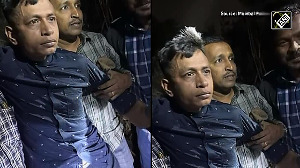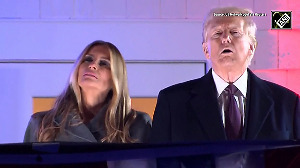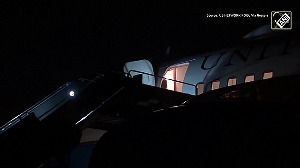 The National Democratic Alliance government, under attack for blocking porn sites, on Monday told the Supreme Court that it does not believe in a "totalitarian" state and cannot become moral police.
The National Democratic Alliance government, under attack for blocking porn sites, on Monday told the Supreme Court that it does not believe in a "totalitarian" state and cannot become moral police.
The government, however, told a bench headed by Chief Justice H L Dattu that it has blocked the “porn sites dealing with child pornography” and this is “standard accepted practice” across the globe.
“Child pornography has to be banned. There is no doubt about it. But, it is difficult as the geographical frontiers have now become meaningless. You ban 10 such websites, five new will come up,” Attorney General Mukul Rohatgi said.
He termed the issue relating to banning of porn sites as "grey area" and said that violation of fundamental right of speech and expression will also arise and hence, it needs a public debate.
“The state cannot become the moral police. We cannot peek inside. The entire issue needs larger debate. Every computer and mobile phone has the child lock... It is difficult to stop such things at the source level,” Rohatgi said.
“We are going towards 'Digital India' and the prime minister is inviting suggestions from public about his 15th August speech,” he said.
On being pointed out by a lawyer that the government has banned porn sites in pursuance of a court order, the bench, also comprising justices Arun Mishra and Amitava Roy said, “We have not passed any such order.”
Meanwhile, the central government asked the Internet service providers to sit with authorities to resolve issues relating to the Department of Telecom order on banning porn websites.
The bench then adjourned the hearing on the plea.
Earlier, the government had assured the court that all possible measures would be taken to block porn sites, particularly those dealing with child pornography.
However, the government, which acted in pursuance of the court's observation, came under attack for blocking porn sites.
“You have not blocked the websites. The petitioner is saying so much,” it had said.
The apex court had earlier asked the Secretary, DoT to file an affidavit on whether the government was competent to issue direction to Internet Service Providers to block porn sites particularly those showing child pornography.
The service providers had submitted that they on their own cannot block such sites and they can do so only on the direction of the government.
The petitioner had pleaded that although watching obscene videos is not an offence, pornographic sites should be banned as they were one of the major causes for crime against women.
It was submitted that the Centre had failed to devise mechanism to block such sites and absence of Internet laws encouraged people to watch porn videos and as it was not an offence.
The petition alleged that over 20 crore porn videos or clippings were freely available in the market, which is directly being downloaded through Internet or other video CDs.
"The sexual content that kids are accessing today is far more graphic, violent, brutal, deviant and destructive and has put entire society in danger, so also safety threats to public order in India.
"The petitioner most respectfully submits that most of the offences committed against women/girls/children are fuelled by pornography. The worrying issue is the severity and gravity of the images are increasing. It is a matter of serious concern that pre-pubescent children are being raped," it had said.
"At best, the IPC only recognises the offences of obscenity, kidnapping, abduction and other related offences which are not sufficient to tackle the issue of pornography, and such videos," it had said, adding that watching and sharing obscene videos should be made non-bailable and cognisable offence.











 © 2025
© 2025